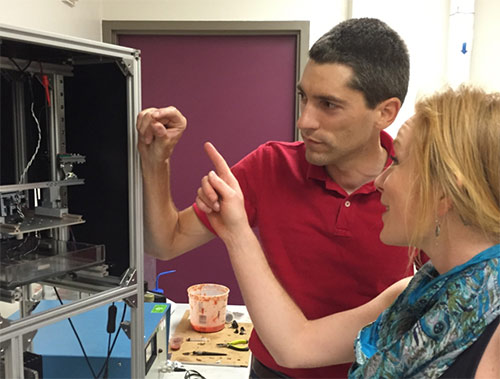Prof. Bart Raeymaekers receives $100,000 grant (for two-years) from the National Science Foundation to conduct research on ultrasound alignment of carbon nanotubes in a polymer medium for additive manufacturing of nanocomposite materials. The grant is supported by the NSF’s Manufacturing Machines and Equipment Program.
Polymer nanocomposite materials consist of a polymer matrix material reinforced with a nanoscale filler material. In particular, polymer nanocomposite materials reinforced with aligned carbon nanotubes are of interest due to their potentially higher strength-to-weight and stiffness-to-weight ratios in the direction of the carbon nanotube alignment, compared to traditional materials. Several methods exist to align carbon nanotubes in a polymer matrix material, including stretching, slicing, and techniques based on electric and magnetic fields. However, these methods are limited in terms of efficiency and scalability. This award supports fundamental research on using ultrasound waves to align carbon nanotubes in a polymer material in a scalable fashion. Research results can potentially enable integrating ultrasound directed self-assembly with a stereolithography additive manufacturing process to fabricate engineered polymer nanocomposite materials with aligned carbon nanotubes. These materials can exhibit mechanical performance that may rival or exceed that of state-of-the-art lightweight materials, and can be used in a wide range of applications, including aerospace, automobile, and infrastructure.
The objective of this research is to establish the relationship between alignment of the carbon nanotubes in the photopolymer matrix and operating parameters of the ultrasound directed self-assembly technique. An experimental approach will be followed to achieve this objective. Carbon nanotubes will be dispersed in liquid photopolymer using surfactant and sonication, and ultrasound directed self-assembly will be used to create line patterns of aligned carbon nanotubes within the photopolymer. The photopolymer will subsequently be cured into a rectangular specimen using a stereolithography additive manufacturing process. The alignment of the carbon nanotubes in the cured photopolymer matrix will be determined using a suite of characterization tools that include scanning electron microscopy, electron computed tomography, and X-ray computed tomography.